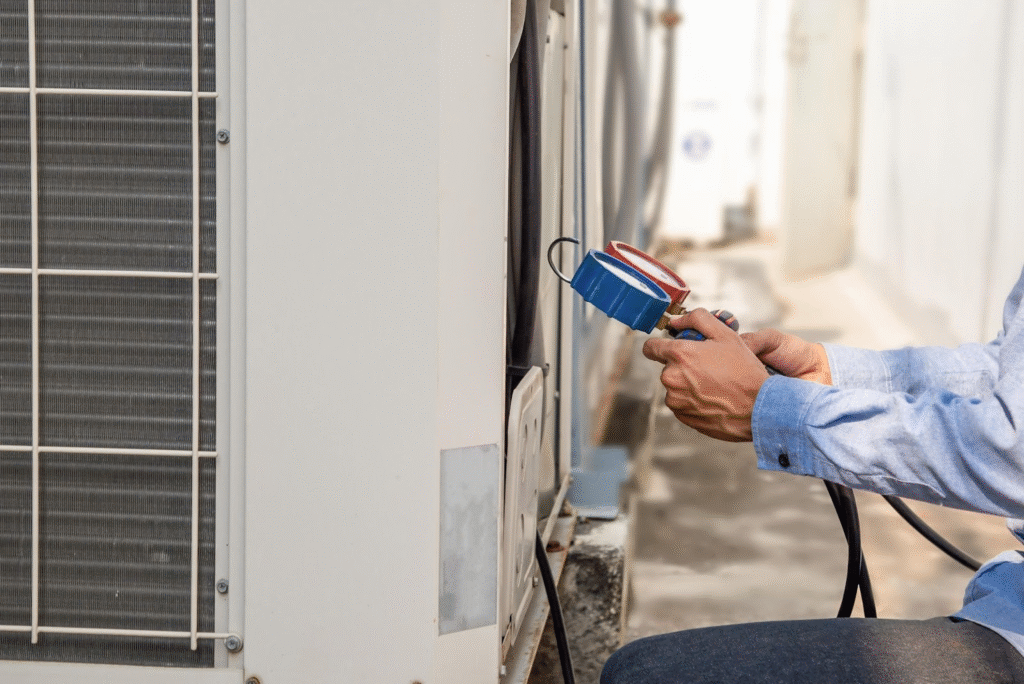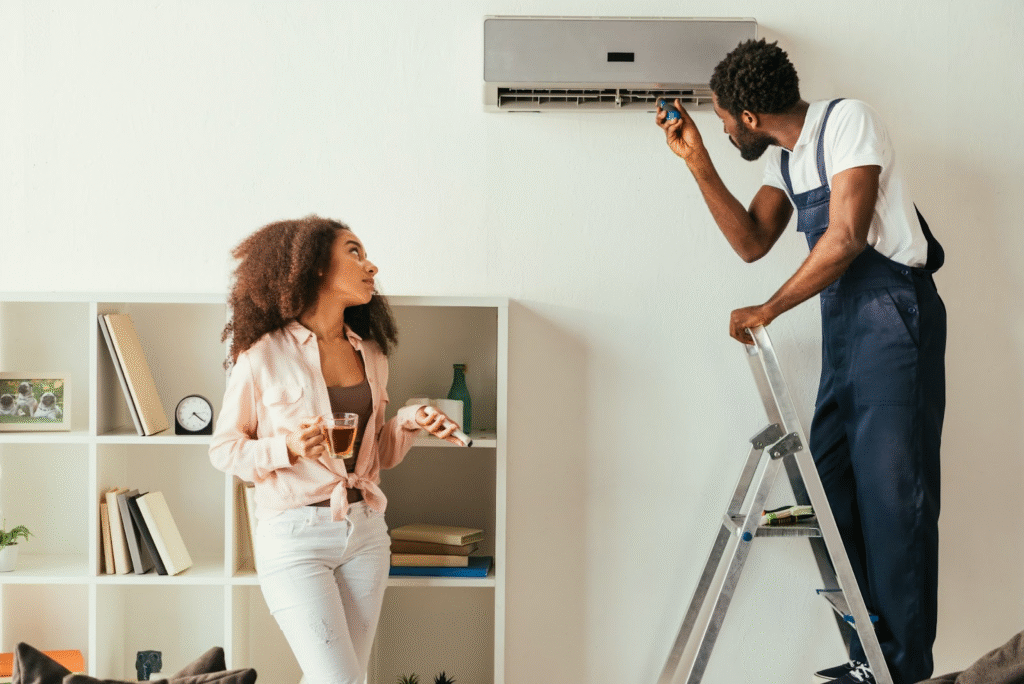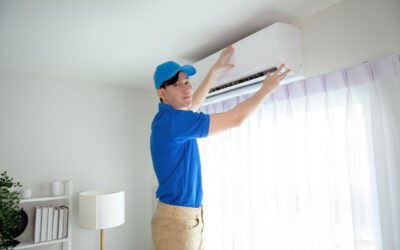How Often Do You Really Need AC Maintenance?

Homeowners expect their air conditioning system to work when they need it. It’s easy to forget the unit exists until something goes wrong. But when cooling suddenly stops on a hot day, the discomfort is immediate. Preventive AC maintenance reduces that risk and keeps systems working when it matters most. Without regular service, even the best systems wear down faster and cost more to run.
Why AC Maintenance is Always Worth it
AC maintenance keeps your cooling system reliable, safe, and energy-efficient. Failing to attend service appointments often leads to breakdowns, higher bills, and reduced performance. Routine maintenance also protects your long-term investment in your property. It’s one of the most practical ways to avoid costly repairs later.
AC Units Aren’t Built to Run Untouched
Air conditioners collect dust, moisture, and wear from daily use. These conditions affect how the system cools your home. Even a minor issue, like a clogged drain, stresses components. Without inspection and cleaning, those problems remain hidden. HVAC technicians check parts you can’t see and correct issues early. That service keeps the system in balance year after year.
Minor Faults Lead to Large Repair Costs
Neglected issues often grow worse over time. A dirty coil can cause compressor strain, which can then cause total failure. What would’ve been a simple fix turns into a complete system replacement. Catching problems early is far less expensive and less disruptive to daily comfort. Consistent upkeep avoids surprises when you least expect them.
Energy Loss Happens Faster Than You Expect
A well-maintained AC runs efficiently and uses less electricity. When filters clog or refrigerant runs low, the unit works harder to cool the same space. It increases your monthly energy bill without improving comfort. According to the U.S. Department of Energy, regular maintenance can lower energy use by up to 15%. That adds up over time, especially in warmer climates. Professional tune-ups keep the system running at peak efficiency.
How Often Do You Really Need AC Maintenance?
Most AC systems need professional service once per year. This frequency keeps performance high, catches damage early, and helps avoid mid-season failures. However, some properties require more frequent maintenance. Usage habits, location, and system age all play a role in setting the proper schedule.
One Annual Service is the Industry Standard
HVAC professionals recommend servicing your air conditioner once every 12 months. Spring is ideal because it prepares the system for heavy summer use. This checkup also clears any issues caused by the previous winter. Delaying service past this window often leads to preventable breakdowns. Annual tune-ups are typically enough for standard systems in average-use homes. It also helps maintain manufacturer warranties that require proof of professional service.
Some Properties Need More Frequent Attention
Homes in hot climates or with constant AC use wear out parts faster. Properties with pets, high indoor dust levels, or ongoing remodeling may also require twice-yearly maintenance. This extra care maintains air quality and avoids debris buildup in sensitive components. Additionally, beachfront homes need special attention due to salt corrosion. These factors can push up the required service frequency beyond once per year. Your technician can help you set a custom schedule tailored to local conditions.
Seasonal Inspections vs. Full Tune-Ups
Seasonal check-ins are short inspections designed to catch urgent issues. They focus on quick evaluations of filters, electrical function, and general airflow. Complete maintenance is more detailed, including deep cleaning, refrigerant testing, and part calibration. While seasonal visits are helpful, they don’t replace full-service calls. For homeowners in areas like Texas or Florida, both are often beneficial. Combining both options improves system reliability across temperature extremes.
What Does AC Maintenance Service Include?
AC maintenance includes several key procedures that protect your system. These involve cleaning, testing, adjusting, and documenting the condition of components. The goal is to reduce future breakdowns and keep the system working efficiently. Technicians follow a specific checklist during each appointment.
Visual Inspection and Deep Cleaning
Every visit begins with a comprehensive visual inspection of both indoor and outdoor units. The technician looks for visible damage, leaks, or dirt buildup. They clean the condenser and evaporator coils, which can collect dust and mold over time. The condensate drain line is flushed to prevent clogs and leaks. Outdoor debris is cleared from the condenser to improve airflow. This cleaning helps your system run more smoothly under pressure.
Electrical and Refrigerant System Testing
Faulty wiring or failing capacitors often cause breakdowns during peak use. Technicians test all electrical connections, amperage draw, and safety controls during service. They also check refrigerant levels to ensure the system is charged correctly. If the refrigerant is low, they’ll look for leaks before adding more. This part of maintenance helps prevent damage to high-cost components like the compressor. Accurate testing also ensures the system cools your home effectively.

Thermostat, Blower, and Airflow Checks
The technician checks your thermostat settings and calibrates the unit if needed. They inspect and test the blower motor and fan to confirm proper function. Ductwork may also be inspected for visible blockages or leaks. Poor airflow affects both comfort and energy efficiency. Adjustments during service help maintain even cooling throughout your home. It also improves humidity control, especially in humid regions.
When to Service Your AC More Often
You don’t always need to wait for the annual tune-up. Certain conditions mean your AC should be looked at sooner. These include early warning signs, recent construction, or heavy use. Identifying the right time can prevent damage and extend the system’s lifespan.
Weak Cooling or Uneven Room Temperatures
If your system starts cooling more slowly or leaves hot spots, that’s a problem. It might mean low refrigerant, blocked vents, or a failing blower motor. These issues often get worse if ignored. A technician can find the exact cause and restore balanced airflow. That kind of early fix costs less than emergency repairs. It also restores comfort before the heat becomes unbearable.
Strange Noises or Unusual Odors
Grinding, squealing, or clicking noises mean mechanical stress. Odors like mildew or burning smells can indicate mold or wiring issues. These signs should not be dismissed as normal aging. Left unaddressed, they often lead to significant mechanical failure. A technician can isolate and fix the issue before more damage occurs. Don’t wait for these warnings to become expensive problems.
Sudden Spikes in Energy Use
If your electric bill rises without an apparent reason, the AC might work harder than it should. Dirty coils, faulty thermostats, or air leaks can cause this. Technicians use specialized tools to diagnose and correct these problems. Restoring system efficiency can reduce your energy costs over time. Regular service helps prevent this type of performance dip. It’s also a smart move in areas with high utility rates.
What Happens When You Skip AC Maintenance
Skipping service can cause more than just discomfort. It leads to expensive breakdowns, reduced system life, and unsafe conditions. Some effects appear slowly, while others happen suddenly. Either way, neglect shortens the value of your HVAC investment.
Wear and Tear Shortens System Lifespan
Neglect increases friction, stress, and heat inside your system. Over time, components like compressors, motors, and fans wear out faster. What should last 12–15 years might fail in half that time. Service visits reduce wear and slow system aging. It’s a small cost compared to a complete AC replacement. Consistent maintenance adds years to your equipment’s useful life.

Warranty Coverage May Be Lost
Most HVAC manufacturers require documented maintenance for warranty claims. If you skip service and something fails, you may pay out of pocket. This can be particularly excruciating when expensive parts, such as compressors or circuit boards, are involved. Having records of regular service protects your warranty. It’s a vital safeguard many property owners overlook. Make sure to keep every invoice or service report.
Poor Air Quality and Health Risks
A dirty AC system spreads allergens, bacteria, and mold spores throughout your home, which is dangerous for people with asthma, allergies, or respiratory problems. Clogged filters and moldy drain pans are common culprits. Service visits help maintain clean, breathable air inside your property and reduce long-term exposure to airborne irritants. If anyone in the home has health sensitivities, regular AC maintenance is non-negotiable.
DIY AC Checks vs. Professional AC Maintenance
Homeowners can handle some AC upkeep tasks, while others require licensed technicians. Knowing which helps you avoid mistakes, fines, or damage. It also keeps your system safer and more efficient.
Homeowners Can Handle Simple Tasks
Changing filters every 30 to 60 days is easy and effective. Keeping outdoor units free of leaves and grass clippings also helps. These simple habits improve airflow and reduce the load on the system. You can also test the thermostat for accuracy and replace batteries if needed. Visual checks for blockages in vents or returns are also smart. These steps support, but do not replace, professional service.
What Technicians Should Always Handle
Technicians carry the tools and training to test high-voltage parts and refrigerant systems. This work can be dangerous and requires certification. Attempting these repairs alone may void your warranty or cause more damage. Licensed pros can diagnose subtle issues you may not notice. They also update service logs needed for warranty support. Let them handle tasks beyond filter changes and outdoor cleaning.
Secure Peace of Mind With Scheduled AC Service
Postponing maintenance usually results in regret. HVAC systems fail at the worst possible times, and emergency repairs cost more. One scheduled service visit per year can avoid most of that hassle. You’ll also enjoy better comfort, cleaner air, and lower utility bills. Property owners who treat maintenance as a fixed priority rarely face system surprises. The choice comes down to proactive care now or bigger problems later.
Don’t wait for a breakdown to learn how your system works. Visit the Cooling & Heating Repair blog for advice that will put you ahead.
Categories
- AC installation
- AC Installer
- AC Repair
- AC Repair/Heater Repair
- AC System Maintenance
- Air Conditioning Repair
- Air Conditioning Services
- Appliance Repair
- Furnace Repair
- Heater Repair
- Heater Repair Services
- Heating Services
- HVAC
- HVAC and Appliance Repair Services
- HVAC Installation
- HVAC Services
- Promotion
- Thermostat installation
- Uncategorized


